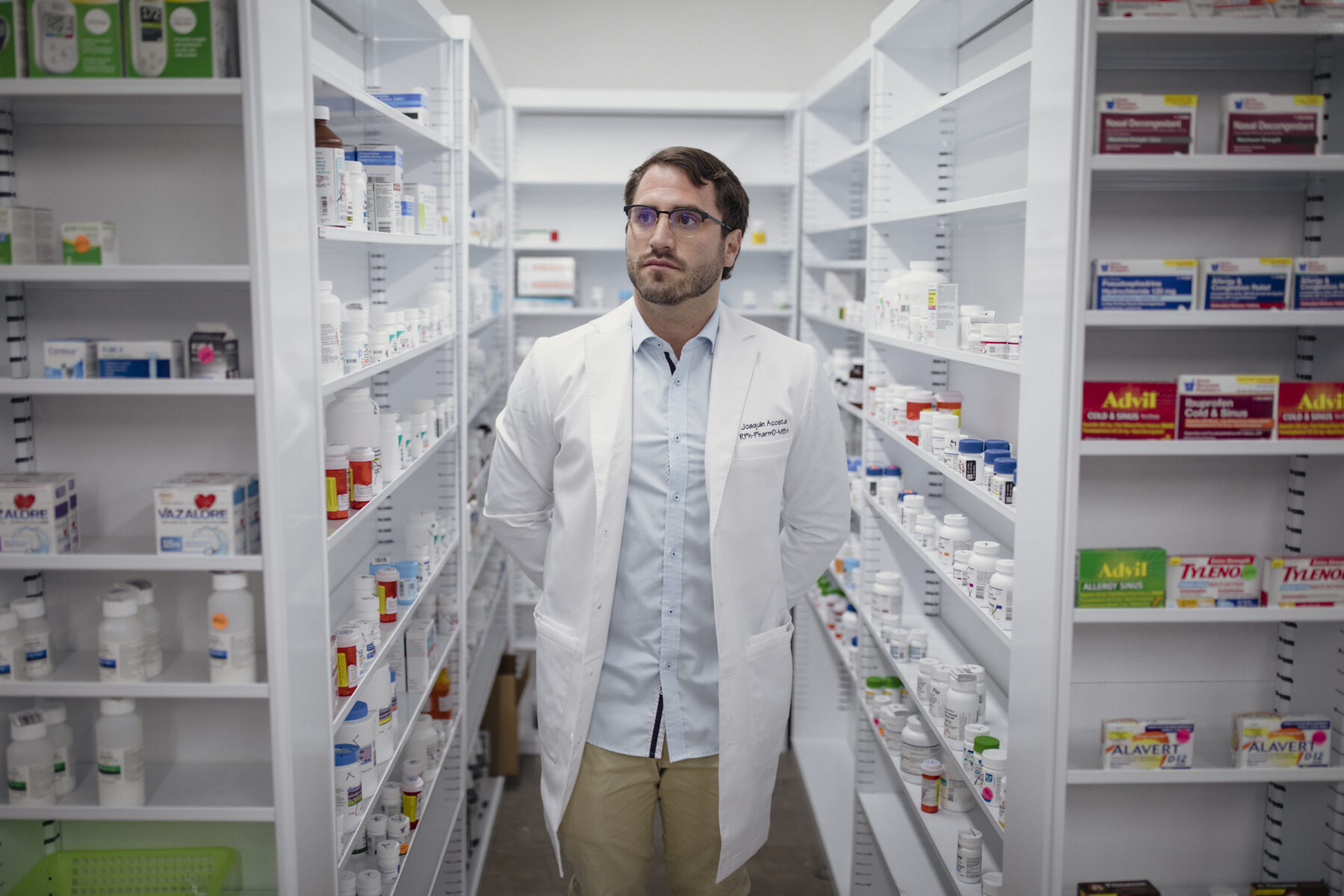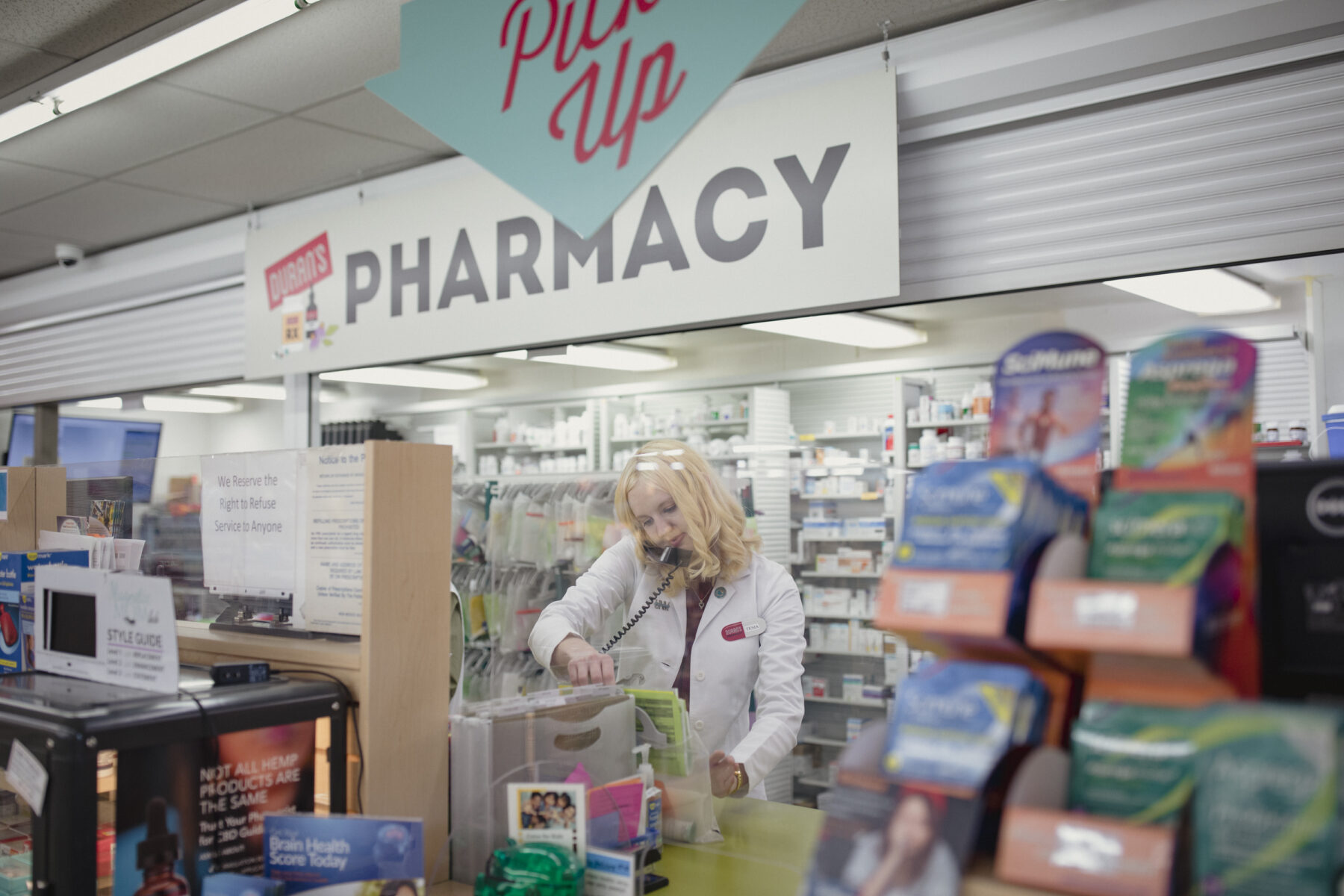Nestled into the heart of Route 66, Duran Central Pharmacy has been providing its “world-famous” red and green chile and personal pharmacy services to travelers and residents of Albuquerque for decades. Now, they’re offering pharmacist-prescribed birth control, too.
Duran’s pharmacist, Tesia Buszkiewicz, did her student rotation and internship at the iconic pharmacy before joining the team as a pharmacist in January. Since then, she’s already written one birth control prescription for someone who couldn’t get an appointment with a primary care physician.
“I think a lot of our patients are now in that boat now where finding a primary [doctor] means you have an appointment three to six months from now,” explained Buszkiewicz. “With birth control, that’s really not something we want our patients to go without for that long. The patients appreciate that we’re more accessible, that they can get an appointment within the same week.”
Buszkiewicz said the option to use the pharmacy — which requires a cash fee for the service for now — is a big deal for rural New Mexicans. “Most patients within our state may have to drive at least an hour to their nearest doctor’s office, whereas the pharmacy may just be right up the street,” she said. “…The more accessible we make it, the more patients are going to get the care they need.”
Right now in the United States, more than 19 million women of reproductive age in need of publicly funded contraception live in contraceptive deserts — places without reasonable access to health centers offering the full range of birth control. And 97% of women who rely on publicly funded health centers must travel to another county to fully access a full range of birth control methods.
Amount of women relying on publicly funded health centers who must travel to another county to fully access a full range of birth control methods.
That’s one reason Bold Futures, a state-based reproductive justice organization in New Mexico, helped push for pharmacist-prescribed birth control. “New Mexico is a very rural state, and a lot of places may not have specialists,” explained executive director Charlene Bencomo. “It may be very difficult to get into a gynecologist or OB, so many people are stuck without contraception if their insurance only approves it after a doctor visit.”
Covid-19 Diminishes Access
It’s a problem that has only intensified during the pandemic. The Guttmacher Institute reports that as Covid-19 swept the world, the women they interviewed experienced diminished access to birth control, including trouble seeing healthcare providers and paying for birth control. Black, Hispanic, queer, and/or low-income women reported the greatest impact.
In both crises — the pandemic and the problem of contraception deserts — pharmacies serve as health care access points. And they’re everywhere: 91% of people live within five miles of a pharmacy. So far, 24 states including Washington, D.C., have passed legislation to allow pharmacists to prescribe hormonal birth control on-site.
Those pharmacies tend to be open outside of traditional health clinic hours — including evenings and weekends — and are familiar places people visit regularly to pick up medicine and groceries. Barriers like the need for child care are also lower when parents can into a pharmacy to access birth control or follow up with issues like side effects or adherence problems.
The more accessible we make it, the more patients are going to get the care they need.Tesia Buszkiewicz pharmacist
The rollout hasn’t always been smooth. There are still issues implementing legislation, getting the word out to the community, and figuring out the mechanisms for pharmacists to get paid for their clinical services by Medicaid and insurance companies — but the pharmacists doing the work are meeting a critical need in their communities. And pharmacies like Duran’s, which has already been granted provider status, may soon get a boost in getting those clinical service fees covered. Provider status allows for pharmacists to bill insurance for their time giving care as a provider.
“We had a giant win at the end of last year,” Bencomo said. “…The Office of the Superintendent of Insurance released a letter to all insurance companies mandating them to inform the people they insure what types of contraception are covered under their insurance and how they can access those types of contraception.”
Pharmacists as Health Care Providers
Just down the road in the college town of Las Cruces, New Mexico, pharmacist Joaquin Acosta prescribes birth control at the Mesilla Valley Pharmacy, which he opened in 2021. Before that, Acosta was a retail pharmacist for chain pharmacies, where he received a “slap on the wrist” for prescribing birth control before the chain had officially launched the service.
“New Mexico is a pretty progressive state as far as the pharmacist prescriptive authority, and so we want to be leaning into as much as we can do,” Acosta said. “I think if people can start associating us as health care providers like that, eventually we might be able to help some people out.”

Since opening the doors about six months ago, Acosta has done three clinical consultations for birth control prescriptions. As a startup still building its client base, the pharmacy is offering the clinical service pro bono.
In addition to independent pharmacies like Duran’s and Mesilla Valley Pharmacy, some pharmacies attached to chain grocery stores make it possible for people to get a prescription for birth control at the same place where they pick up their milk and bread every week.
“I had a few patients that were in between providers or maybe lost their insurance,” said Steve Nzele, a pharmacist at a Fred Meyer grocery store in Vancouver, Washington. “So, it was really beneficial for them to be able not to stop therapy until they can get to another provider. I also had a patient who was coming from another country. They just happened to be here, and they forgot their medication. In order to avoid stopping therapy, we were able to fill that gap.”
Nzele has been prescribing birth control since his residency in 2018 and, prior to the pandemic, was doing one clinical consultation for birth control every two or three months. “It’s very beneficial for patients,” he noted. “And I hope that, in the future, it serves as an example to launch other services at the pharmacy.”
Convenience and Privacy
In San Diego, California, pharmacist Tony Vu can prescribe a year’s supply of birth control at Von’s — another grocery chain — pharmacy. He said that benefits people who have just moved to the military city. It also provides an alternative for people who aren’t comfortable visiting a gynecologist or clinic — especially young people and gender-diverse people.
“It’s easy access for communities who are afraid to go to places like Planned Parenthood, wondering or hoping that their parents or their friends or people are going to judge them,” Vu explained. “We have private rooms where I can help discuss what their needs are, what they’re looking for in terms of birth control, what’s safe for them. And we just try to make it easy and an approachable place.”
Right now, Vu’s pharmacy charges $40 – 50 for the clinical consultation — which they advertise on signage in the store lobby — and this fee is reimbursable by California’s Medicaid program for up to $45. Vu said that knowing the consultation cost upfront is helpful for people without health insurance who may worry about hidden costs when paying for a medical visit out of pocket.
Pharmacist Kathleen Hill Besinque is a professor and the director of experiential programs at Chapman University in Irvine, California. She trains the next generation of pharmacists and maintains a small clinical practice at a Pharmaca clinic in Santa Monica, where she prescribes birth control pro bono.
“With Covid, I’ve had a lot of women come in because they can’t get an appointment with their clinician,” Besinque said. “And probably the biggest source of my patients that I write prescriptions for is when someone calls for a refill, and they don’t have refills, and their clinician’s offices are closed…and so the technician in the pharmacy will say, ‘You know, the pharmacist can do this.’”
Besinque said that, in many places, pharmacists have been providing limited clinical services for a while. That may include things like immunizations, travel medicine, pre-exposure prophylaxis (PrEP) for HIV, and medication therapy management.
“We’re getting to be more and more of a wellness and public health center. And there are more medications and disease states that are really easily managed by a pharmacist in a pharmacy and don’t really require a trip to a physician’s office. And that kind of keeps the physician’s office available for people who do need them.”







